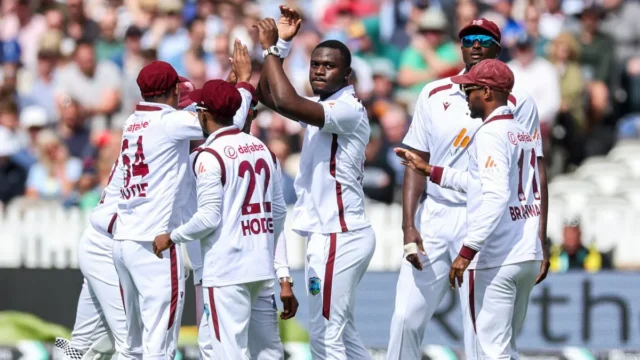Greg Barclay’s last act as chairman of the International Cricket Council was to ring the bell to signal the start of play on day three of the Christchurch Test.
Now, sitting in the Sir Richard Hadlee indoor school at the Hagley Oval, he is sounding an alarm of a different sort, highlighting the biggest issues that his successor, Jay Shah, faces over the next three years since taking over on Dec 1.
In a wide-ranging interview with Telegraph Sport, Barclay, a quietly spoken New Zealander with a businessman’s boardroom bearing.
He also warns the game is “sleepwalking to the cliff edge” over the dwindling sports broadcast rights market that earned the ICC £2.4 billion when it signed its last deal for 2024-2027 but he believes may more than halve when they go to market again.
Barclay was unable to untangle the congested international calendar over his four-year tenure that began in Covid and ended with more cricket than ever before crammed into the year.
“I reckon, gee, I’m at the apex of the game and I can’t tell you who’s playing around the world. In fact, I didn’t realise that Sri Lanka were in South Africa until I read about Marco Jansen’s seven wickets this morning,” Barclay admits.

“Somewhere in the world there’s a T20 competition being played. I see one’s popping up in Guyana. While we were in the States [for the T20 World Cup] they were setting up a T10 competition that seemed to attract a reasonable number of international players. But apparently they didn’t even have facilities.
They were mowing strips out of a football or rugby field to play on. It was so bad they couldn’t have the quicks going on it.
“So we’ve lost perspective. It’s not great for the game at all. It’s a mess. The calendar is incredibly congested and self-interest is such that it’s almost impossible to untangle all of that, because no one’s going to give up their content.”
This is the task facing Shah who, at 36, is the youngest ever chair of the ICC and comes to the job with the Board of Control for Cricket in India more powerful than ever before. “I think he’s got a great opportunity to use what he’s got in his background to help India take the game to another level, but without making it sort of under the yoke of India as well,” Barclay says.
“We’re really lucky to have India, they’re a massive contributor to the game across all the measures, but one country having that amount of power and influence does distort a whole lot of other outcomes, which is not necessarily helpful in terms of that global growth.
“Jay has the ability to bring India into the international fold even more. There are a number of things that India could do to help unite and grow the game, including commercially helping to pool off-shore rights, using their teams to give opportunity to smaller full members and emerging countries [such as their A teams and development teams], using their clout to open new territories and markets, collaborating closely with the ICC to help benefit members, as examples.
India has shown itself to be very innovative with things like the IPL, and they are leaders in the sport, so continue to do that to help the game grow globally.”
Barclay warns the recent £6.7 billion merger between Disney and Reliance in India drastically cuts competition in the market for broadcast rights in Asia that bankroll the game. “We’re so stuck in our model that’s 10 years out of date.
Test cricket is a case in point. I love Test cricket. It’s really the only form of cricket that I’m watching, but if you think about it, you’ve got 120 countries out there playing cricket, men and women, and only seven or eight really are playing Test cricket.
“Legacy and tradition is important, but I think a lot of the boards are sitting there and spending 80 per cent of their time worrying about Test cricket and how they can make that work, and forgetting that in actual fact the event that is going to grow the game, is going to pay your bills, is the other end of the spectrum from Test cricket.
So we are rooted in this sort of outmoded and outdated thinking. So I think that’s going to have to change if we want to sustain the game moving forward.”
Any cut in the ICC’s £2.4 billion rights deal for its world events will have a seismic impact on the smaller nations. Take New Zealand as an example. Of their £71 million revenue, around 35-40 per cent is from the ICC.
“That is one thing that worries me, is that the game is sleep-walking to the edge of the cliff. It is changing, and trying to get an understanding of what that change looks like, what it means for the game, seems to be a bit of a battle, because the problem is that everybody’s used to only ever seeing broadcast revenues rise.
“At some point, it is going to correct. It’s a market. Is it going to be a sharp, severe correction? Or is it going to be a long, slow one? Or maybe there’s going to be an alternative broadcaster that comes to the market?
But people have been saying that for 10 years now. New Zealand cricket had a deal with Amazon, but it didn’t work, so I don’t think they’re going to be the white knight that everybody is anticipating. I just think what we’ve got in front of us is what we’ve got.
“I know that when we did our current deal it was way in excess of what the valuations we got before we went to market. We got £2.4 billion just out of India.
The next biggest one is UK Sky. They did an eight-year deal, which was £237 million, so that’s 10 per cent of the India deal for double the length of time.
So if we go back to what the original projection was of £800 million it more than halves ICC revenue. It could even be less than that. There’s no discernible replacement for that at the moment.”
It would have a shattering effect on the West Indies, and smaller nations such as Ireland and Zimbabwe, who struggle to keep heads above water.
Zimbabwe visit England for a Test match this summer for the first time in nearly 20 years, while West Indies cricket continues to live on the breadline.
“You look at the West Indies. I love what they’ve done for the game. But is the West Indies in its current form sustainable? Is it time for them to break into each of their islands?,” Barclay says.
“The thing is, can they [West Indies] afford to [continue to play Test cricket]? They barely can make their books balance now. What they’ve achieved in cricket is phenomenal when you think that they are a group of disparate islands that don’t really have anything in common, other than cricket, and yet they’ve held themselves together for that period of time as the West Indies.
“But I think one thing that will kind of highlight all that will be with the Olympics and other multi-sport events.
They played cricket in the Asian Games last year in China, you’ve got the African Games, [where] cricket featured for the first time. They’re looking at the Pan American Games.
So when you’ve got all these multi-sport events, what happens then to the Windies? The Commonwealth Games in Birmingham, Barbados turned up as the participant for the region. Is that a little glimpse of what the future looks like? I don’t know.
“There’s some structural change that probably needs to be contemplated. Some countries are trying to play Test cricket that maybe shouldn’t.
Why are Ireland playing Test cricket? Whatever money they’ve got surely they should be investing into grass roots to try and grow their numbers. The only way to get kids to play the game is in short form.
They’re not going to turn up and play red ball all day Saturday, all day Sunday. That’s not going to happen. Every time they’re playing a Test, they lose an enormous amount of money. Again, why would you do that? It makes no sense.
Why is Zimbabwe playing Test cricket? They lose money on the broadcast deal, so it makes no sense at all.
“The West Indies would say why do we go from full member to 14 associates? But that is about really getting the governance thing right. Cricket is almost unique. You’ve got this group of full members, and you’ve got the rest.
Surely just dispense with that and go, OK, someone’s number one, and somebody’s number 120. And you can move up and down, get ranked on performance, on and off the field.
The higher up you go, the more money you get, the more exposure you get. And if you’re not performing, then you go down.” (Telegraph Sport)






